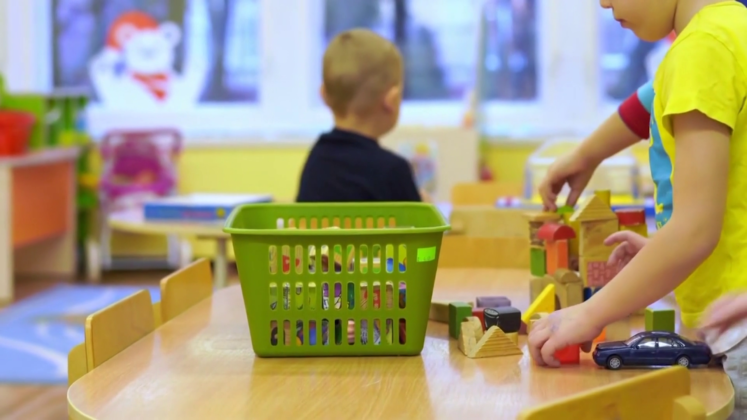No products in the cart.

Survey: Mass. children waiting 6-plus months for behavioral, mental health care
Survey: Mass. children waiting 6-plus months for behavioral and mental health services
NEXT TO YOU. SO FIVE ON YOUR MENTAL HEALTH NOW THERE’S A NEW STATE SURVEY THAT WAS JUST RELEASED, AND IT SHOWS THOUSANDS OF MASSACHUSETTS CHILDREN ARE WAITING UPWARDS OF SIX MONTHS FOR BEHAVIORAL AND MENTAL HEALTH SERVICES. SIX MONTHS. THE ISSUE IS A COMBINATION OF A LACK OF WORKERS IN THE FIELD AND LOW REIMBURSEMENT RATES FROM INSURERS, NONPROFIT CLINICS AND AGENCIES THAT PROVIDE HOME CARE SAY THEY’RE HAVING A HARD TIME RECRUITING AND RETAINING CLINICIANS WHEN THEY CAN EARN TWICE AS MUCH. WORKING IN HOSPITALS, SCHOOLS OR FOR PRIVATE PAY CLIENTS. BREAKING DOWN THE DATA HERE. SO THE ASSOCIATION FOR BEHAVIORAL HEALTH SURVEYED 30 PROVIDER ORGANIZATIONS IN MASSACHUSETTS THAT SERVED A COMBINED 15,540 CHILDREN AND TEENS OVER AN 11 MONTH PERIOD. FAMILIES INSURED BY MASSHEALTH WAITED AN AVERAGE OF MORE THAN 20 WEEKS FOR IN-HOME SERVICES, AND THOSE IN PRIVATE INSURANCE WAITED AN AVERAGE OF MORE THAN 26 WEEKS, AND CRITICAL CLINICAL STAFF HAVE BEEN LEAVING THEIR POSITIONS IN DROVES SINCE SEPTEMBER OF 2021, MORE THAN 1500 CHILD SERVING PROFESSIONALS LEFT THEIR AGENCIES, AND FOR EVERY TEN STAFF THAT LEFT, ONLY EIGHT WERE HIRED. WHICH, OF COURSE, IF YOU DO THE MATH, LEAVES HUNDREDS OF VACANCIES HERE TO TALK ABOUT. THIS IS DOCTOR KHADIJA WATKINS, A PSYCHIATRIST AND THE ASSOCIATE DIRECTOR OF THE CLAY CENTER FOR YOUNG HEALTHY MINDS AT MASS GENERAL HOSPITAL. GOOD TO SEE YOU, DOCTOR. THANK YOU FOR HAVING ME BACK. HEY THERE. YOU KNOW, WE’RE TALKING ABOUT YOUR WORLD HERE, RIGHT? ARE YOU WORRIED ABOUT WHAT’S HAPPENING? UH, I’M DEFINITELY WORRIED. AND I’M HOPEFUL. YOU KNOW, I’M WORRIED THAT WE HAVE THAT OUR YOUNG PEOPLE AREN’T DOING WELL AND THAT WE DO NOT HAVE THE RESOURCES AND THE WORKFORCE TO MEET THEIR NEEDS. UM, YOU KNOW, AND WHAT WE ALSO KNOW IS THAT UNTREATED MENTAL ILLNESS IS DISRUPTIVE. IT LEADS TO A LOT OF PAIN AND SUFFERING, AND IT CAN BE LIFE THREATENING. SO I AM HOPEFUL BECAUSE WE’RE HAVING CONVERSATIONS LIKE THIS AND WE’RE TALKING ABOUT THE NEED AND THE AREAS THAT WHERE WE CAN IMPROVE AND THAT WE’RE THINKING CREATIVELY ABOUT HOW WE CAN BEGIN TO INCREASE AWARENESS AND EDUCATION. AND I THINK THAT WILL HELP BECAUSE WE CAN START, YOU KNOW, ENGAGING IN PREVENTATIVE ACTIONS. WE CAN IDENTIFY THINGS EARLY AND ACT SOON. UM, BUT WE’RE ALSO TALKING ABOUT HOW WE CAN BE MORE CREATIVE ABOUT RESOURCES AND SERVICES TO BE ABLE TO MEET FAMILIES AND KIDS WHERE THEY ARE, WHETHER THAT LOOKS LIKE, YOU KNOW, GROUPS GOING INTO THE COMMUNITY OR REALLY LEANING INTO PEER SUPPORTS. UM, JUST AS AN EXAMPLE, AS YOU KNOW, A DAY CAN FEEL LIKE A YEAR FOR PARENTS WITH KIDS WHO ARE STRUGGLING. THEY MAY NOT HAVE TIME TO BE PATIENT, TO WAIT FOR ALL OF THIS, BUT IS THAT THE ONLY OPTION? NO, WAITING IS NOT THE ONLY OPTION. WHAT I DO, WHAT I REALLY ENCOURAGE PARENTS TO DO, IS REALLY TO LEAN INTO THEIR PCP OR THEIR PEDIATRICIAN. THE THE PEDIATRICIAN IS REALLY THE GATEKEEPER OF MENTAL ILLNESS. THEY CAN OFTEN, YOU KNOW, START TREATMENT AND BE A BRIDGE. THEY CAN SOMETIMES HAVE PEOPLE IN THEIR OFFICES THAT CAN PROVIDE SUPPORT, UM, OTHER WAYS THAT WE CAN KIND OF GET SUPPORT IS LOOKING INTO THE SCHOOLS. SOMETIMES SCHOOLS HAVE PEOPLE ON STAFF AND THEN ONLINE RESOURCES CAN BE AVAILABLE. YOU KNOW, DEPENDING ON THE SEVERITY OF WHAT’S GOING ON WITH YOUR CHILD ONLINE, YOU MIGHT BE ABLE TO FIND LIKE THROUGH NAMI OR THE CLAY CENTER, REPUTABLE ALL KIND OF STRATEGIES AND TOOLS THAT YOU CAN USE TO SUPPORT YOUR YOUNG PERSON. YOU KNOW, WE JUST TALKED ABOUT THOSE NUMBERS TOO. JUST MOMENTS AGO. HERE WE TALK ABOUT THE MENTAL HEALTH INDUSTRY HAVING A HARD TIME RECRUITING. DO YOU HAVE A MESSAGE TO ANYONE WHO MAY BE CONSIDERING WORKING IN THE MENTAL HEALTH FIELD OTHER THAN, WE NEED YOU? UM, RIGHT. DEFINITELY. YOU KNOW, THIS IS A I WOULD SAY THIS IS A REALLY REWARDING, UH, PATH TO GO DOWN AND WHAT I WOULD ENCOURAGE PEOPLE TO DO IF THEY THINK THAT THEIR INTEREST ED IS TALK TO PEOPLE WHO YOU KNOW, RECEIVE MENTAL HEALTH TREATMENT AND LET THEM TELL YOU THEIR STORY ABOUT HOW, YOU KNOW, THEIR PROVIDERS CHANGED THEIR LIFE. TALK TO PROVIDERS IN THE FIELD AND GET TO KNOW WHAT THEIR EXPERIENCE IS AND GET MORE EXPOSURE, BECAUSE THIS IS REALLY THE ONLY WAY THAT, YOU KNOW, IF THIS IS A JOB THAT YOU WANT TO DO. UM, BUT BECAUSE IT’S NOT REALLY A JOB, IT’S IT’S A CALLING. BUT I WOULD JUST ENCOURAGE PEOPLE TO GET EXPERIENCES AND EXPOSURES TO MENTAL HEALTH BECAUSE THERE’S SO MAN
Advertisement
Survey: Mass. children waiting 6-plus months for behavioral and mental health services
A new state survey just released shows thousands of Massachusetts children are waiting upwards of six months for behavioral and mental health services.The issue is a combination of a lack of workers in the field and low reimbursement rates from insurers.Nonprofit clinics and agencies that provide home care say they’re having a hard time recruiting and retaining clinicians, when they can earn twice as much working in hospitals, schools or for private-pay clients.The Association for Behavioral Health surveyed 30 provider organizations in Massachusetts that served a combined 15,540 and teens and children during an 11-month period.Families insured by MassHealth waited an average of longer than 20 weeks for in-home services, and those with private insurance waited an average of more than 26 weeks.“What we also know is that untreated mental illness is disruptive. It leads to a lot of pain and suffering, and it can be life-threatening,” said Dr. Khadijah Booth Watkins, a psychiatrist and associate director of the Clay Center for Young Healthy Minds at Mass General Hospital.Clinical staff have been leaving their positions in droves. Since September 2021, more than 1,500 child-serving professionals left their agencies. For every 10 staff that left, only eight were hired, leaving hundreds of vacancies.Booth Watkins said increasing awareness and education can help preventative actions.“We can identify things early and act. So, we’re also talking about how we can be more creative about resources and services to be able to meet families and kids where they are, whether that looks like groups, going into the community or really leaning into peer supports, just as an example,” Booth Watkins said.Booth Watkins said families should not wait to seek care if their child is struggling. She said start by contacting your child’s primary care physician and reach out to your child’s school for resources.
A new state survey just released shows thousands of Massachusetts children are waiting upwards of six months for behavioral and mental health services.
Advertisement
The issue is a combination of a lack of workers in the field and low reimbursement rates from insurers.
Nonprofit clinics and agencies that provide home care say they’re having a hard time recruiting and retaining clinicians, when they can earn twice as much working in hospitals, schools or for private-pay clients.
The Association for Behavioral Health surveyed 30 provider organizations in Massachusetts that served a combined 15,540 and teens and children during an 11-month period.
Families insured by MassHealth waited an average of longer than 20 weeks for in-home services, and those with private insurance waited an average of more than 26 weeks.
“What we also know is that untreated mental illness is disruptive. It leads to a lot of pain and suffering, and it can be life-threatening,” said Dr. Khadijah Booth Watkins, a psychiatrist and associate director of the Clay Center for Young Healthy Minds at Mass General Hospital.
Clinical staff have been leaving their positions in droves. Since September 2021, more than 1,500 child-serving professionals left their agencies. For every 10 staff that left, only eight were hired, leaving hundreds of vacancies.
Booth Watkins said increasing awareness and education can help preventative actions.
“We can identify things early and act. So, we’re also talking about how we can be more creative about resources and services to be able to meet families and kids where they are, whether that looks like groups, going into the community or really leaning into peer supports, just as an example,” Booth Watkins said.
Booth Watkins said families should not wait to seek care if their child is struggling. She said start by contacting your child’s primary care physician and reach out to your child’s school for resources.





